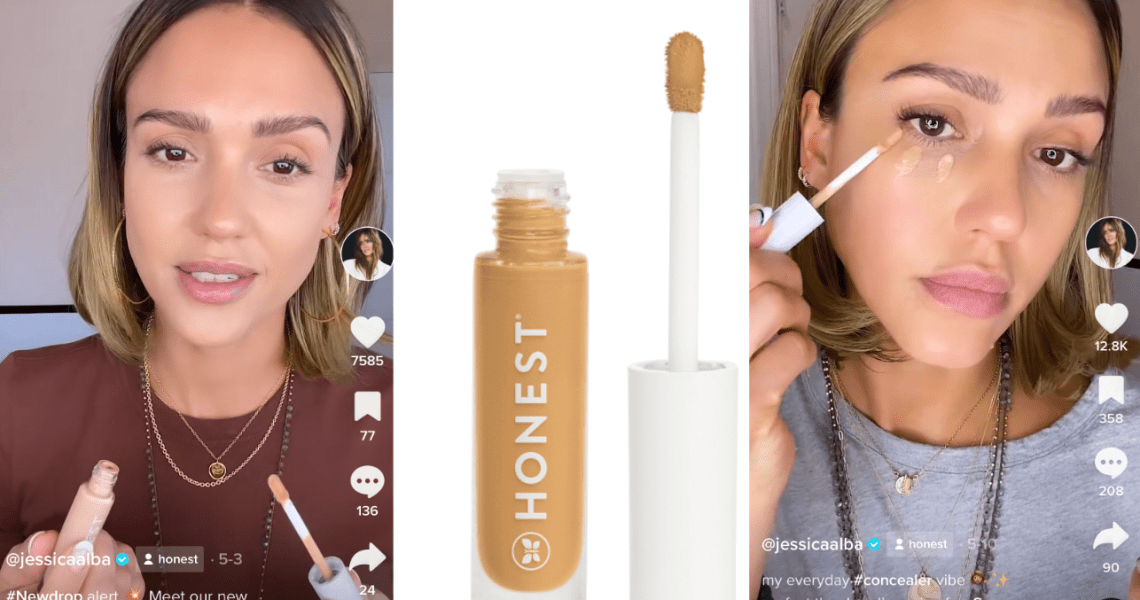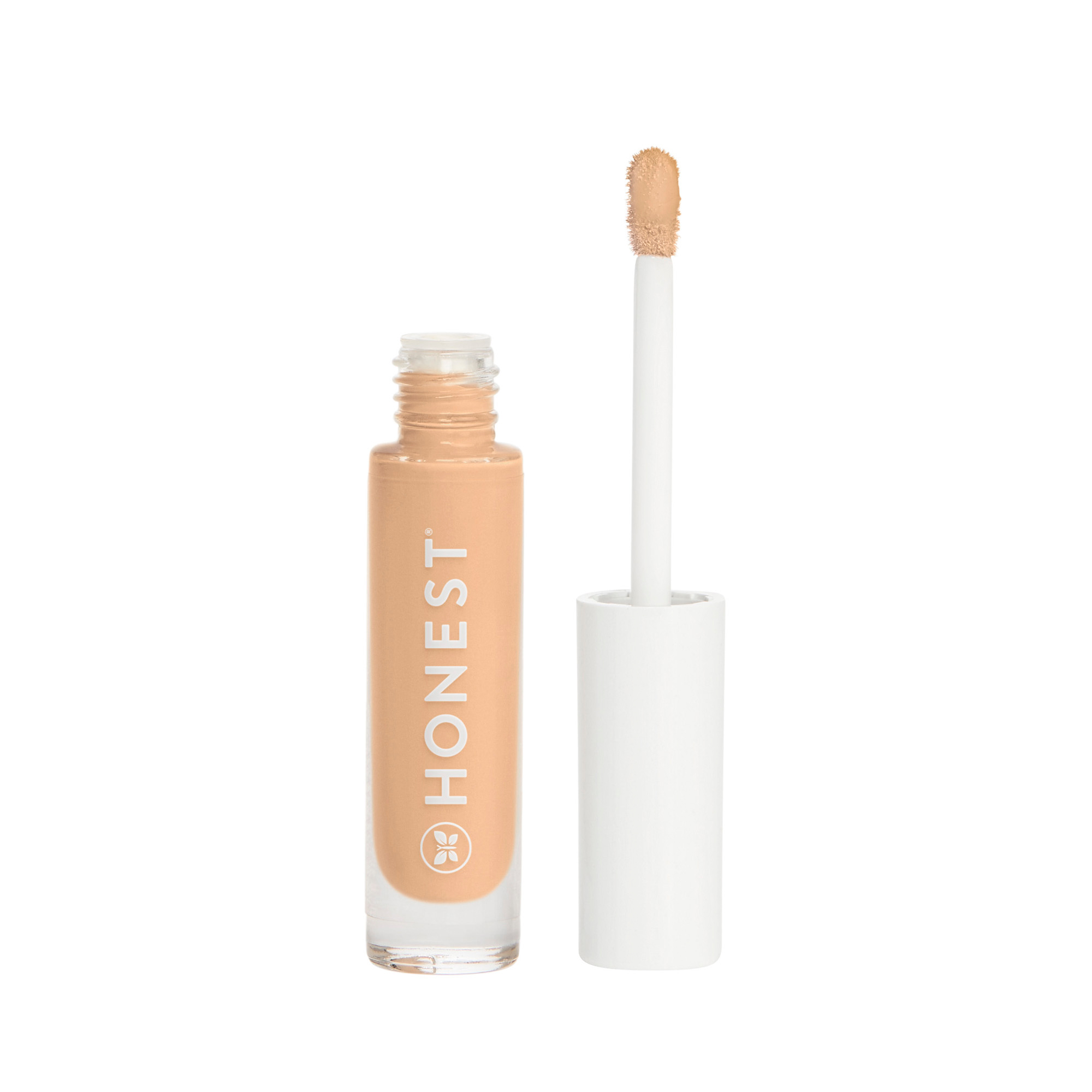All products featured on Glossy Pop are independently selected by our editorial team. However, when you buy something through our retail links, we may earn an affiliate commission.
There may be a new celebrity beauty brand launching every month, but Jessica Alba’s Honest Beauty has been around since 2015 and is one of just a few that have a listing on the New York Stock Exchange. Honest Beauty IPO’ed in May 2021, but it just launched its first concealer, the Fresh Flex Concealer. In step, Alba caught up with Glossy to talk makeup, celebrity brands and all things Honest Beauty.
A lot of brands are launching concealers all of a sudden. Why the trend?
“We saw a lot of lip and cheek launches and complexion innovations prior to Covid. But then, because of all the mask wearing, it was just about the eyes. Now, we’re going back into the world, so we need a concealer again.
We’ve been developing these for quite a while. It was a debate: Do we go into liquid foundation or do we do liquid concealers? I really liked the flexibility [of the Fresh Flex Concealer], because I’m more of a spot conceal person. I don’t always wear a full face. It’s nice to do a little something here or there and look like you’re not wearing anything day-to-day. This formula also has skin-care benefits and is really long wear. To have both of those together is pretty unique. I wanted people to look fresh. Being an actress and being used to close-ups and cameras, you don’t want to look like you’re wearing a ton of makeup. You want to look fresh.”
What else makes the Honest Beauty concealer special?
“We have this proprietary long-wear technology that we put in our long-wear lip. It’s also in the concealer and in the new liquid shadows that are coming out soon, and it’s great because it has skin-care benefits. Most makeup can kind of age you, because it’s made with such harsh chemicals for the long-wear properties. Usually, when [companies] formulate [makeup], they don’t consider the skin. That’s why I built a lab in-house, and I have a team of chemists, as well as regulatory and sourcing [teams]. All of that is because I was really frustrated with the fact that you kind of have to go to the same formulators. There aren’t a ton, and everybody’s using the same ones. [Brands] differentiate [themselves in] packaging, and then the claims they pay for against the formula. I was like, ‘Let’s not do that. Let’s really be transparent. Let’s formulate exactly what we want to get in the payoff and the benefit.'”
What do you think about the evolution happening in the “clean” beauty space now, the “clean-washing” and the turn against clean?
“Truly clean is science-based. It’s taking a lot of the academic papers that have studied exposure to chemicals and how your exposure to these chemicals — in the air, soil, your water, your beauty and skin-care products and even food products — could affect your health over time. That is a tactic to scare people, so my approach was, ‘How about I gently educate and give people a better option?'”
Is it frustrating for you to see celebrity brands get a bad rep?
“I don’t even care about celebrity or non-celebrity. It’s when people expect or think that something that is the hot thing of the moment, whether it’s a celebrity makeup brand or whether it’s a ‘green’ or ‘eco’ brand, [is clean]. All of it is greenwashed. It’s very difficult to formulate at the standards we have in clean.
There’s also a perception that, if it costs more, it’s going to work better or it’s going to be more effective. But, I know where a lot of this is made. That $10 product is the same formula as the $60 one. You’re just paying for the brand. I’ve seen under the hood of all of it. It just goes to show how important the romance and the storytelling around a brand is. People believe what they see and what they read.”
There’s so much less trust in media today and more trust in influencers. Why do you think that is?
“It’s interesting because there isn’t a vetting process when you’re just a rando off the street that puts a camera in their room and decides to test product, and then they become experts. But, it has made [beauty] more diverse. It’s empowered people to educate themselves, which I am always a fan of. It’s interesting how quickly it all has changed. It feels like the marketplace hasn’t quite caught up to where the consumers are, as far as their appetite for diversity.”
Has social media or TikTok, which you are active on, impacted Honest’s product development in any way?
“I wouldn’t say product development has changed with the evolution of TikTok, but I would say it’s cool to see different ways of storytelling. If nothing else, what these various [social] mediums tell you is that all [brands and retailers] are just trying to get people in their doors, whether it’s an Amazon-exclusive brand, Target, Walmart, Nordstrom, Sephora or Ulta. They’re trying to story-tell and romance as much as possible, and they know the best people to do that are probably the people who spend all their time speaking to the audience, who are influencers.
For me, it’s exciting, because, in a lot of ways, I paved the way for that business model, of: ‘Hey, I know how to reach this audience. I have an authentic relationship with them.'”
What should we know about how Honest Beauty is storytelling around its new launch?
“What makes somebody the most beautiful isn’t them covering themselves up, but enhancing what makes you, you and beautiful. I love the word ‘flex,’ and, based in how this formula flexes, my creative director had the idea to bring out the flex in people. So I got my friends, my niece, my sister-in-law, my daughter and my friend who founded ClassPass to participate in the campaign. I wanted it to feel authentic and real and show how dynamic people are. What I hope our beauty line can do is highlight what makes you unique. It isn’t [about] a narrow beauty standard. Your quirks and your confidence are what makes you the most beautiful.”





